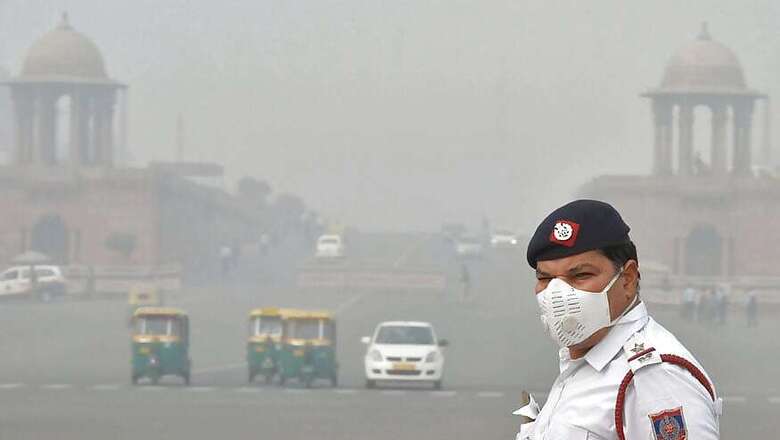
views
New Delhi: After a brief respite, Delhi's air quality deteriorated and oscillated between 'poor' and 'very poor' categories while the NGT directed the Agriculture Ministry and Punjab, Haryana, UP and Delhi to periodically review steps taken to stop stubble burning incidents.
The air quality deteriorated due to increased pollutant holding capacity of the air and stubble burning in the neighbouring states.
Government body SAFAR said fire counts from stubble burning increased in past 24 hours which might contribute 8-10 per cent to the pollution in Delhi. It warned that pollution was likely to deteriorate further by Saturday but it would remain in the 'very poor' category.
The Supreme Court-appointed EPCA chairperson Bhure Lal said more cases of stubble burning in the neighbouring states were recorded this time as compared to last year despite a strict enforcement of the ban.
The overall air quality index was recorded at 339 which comes under the 'very poor' category, according to Centre-run System of Air Quality and Weather Forecasting (SAFAR).
However, according to the Central Pollution Control Board (CPCB) data, the overall air quality index (AQI) was recorded at 282 which falls in the 'poor' category.
Delhi's air quality has showed significant improvement in the past two days after rain washed away the pollutants but the rainfall also led to increase in capacity of the air to hold pollutants, SAFAR said.
Air pollution is on the path of reversal and has increased after the impact of rain is over and AQI is entering in very poor range.
"The pollution level is likely to deteriorate further by Saturday but will remain in very poor category. Although wind speed is better (higher) but holding capacity is also high due to moisture which is unfavourable," the SAFAR said in a report.
Fire counts from stubble burning increased in past 24 hours which may contribute 8-10 per cent to Delhi pollution, the report said. On Friday, the PM2.5 (particles in the air with a diameter of less than 2.5 micrometres) level was recorded at 140, while the PM10 level was recorded at 234, according to CPCB data.
Faridabad recorded very poor air quality while Ghaziabad, Gurgaon, Greater Noida and Noida recorded "poor" air quality. An AQI between 0 and 50 is considered good, 51 and 100 satisfactory, 101 and 200 moderate, 201 and 300 poor, 301 and 400 very poor, and 401 and 500 severe.
Eleven areas in Delhi recorded "very poor" air quality and 26 areas recorded poor air quality, according to the data.
Bhure Lal said more cases of stubble burning in the neighbouring states were recorded this time as compared to last year despite a strict enforcement of the ban. He stressed on the need to bring a change in the mentality of people so that they look at the alternatives to this practice.
Speaking at a workshop on Bulk Utilisation of Crop Residue for Economic and Environmental Sustainability organised by the PHD Chamber, he said paddy straw can be a very rich source of fertilisers and its best utilisation would be to merge it with soil.
Stubble burning in neighbouring Punjab and Haryana is one of the major causes for poor air quality in Delhi.
The EPCA chairman pointed out that despite the fact that "enforcement was strict this time, more stubble burning was recorded this year as compared to last year".
Lal said it had been seen that the younger generation was ready to look for alternatives, but the older generation still wanted to stick with stubble burning.
In a letter to the CPCB recently, Lal had recommended implementation of either the odd-even scheme or a complete ban on non-CNG private vehicles if the air pollution level in Delhi increased again.
The NGT directed the Agriculture Ministry and the chief secretaries of Punjab, Haryana, Uttar Pradesh and Delhi to periodically review steps taken to stop crop burning incidents.
A bench headed by NGT Chairperson Justice Adarsh Kumar Goel said there was a need to adopt a multi-method approach through in situ and ex situ management of crop residue to minimise stubble burning incidents.
The green panel directed the states to compile data on instances of stubble burning "appropriately through revenue records" and asked the Centre to "disburse funds well in time" so that they can be utilised by the states.
It directed the Agriculture Ministry to furnish a status report to this tribunal on or before April 30, 2019 and said it would consider it on May 9.




















Comments
0 comment